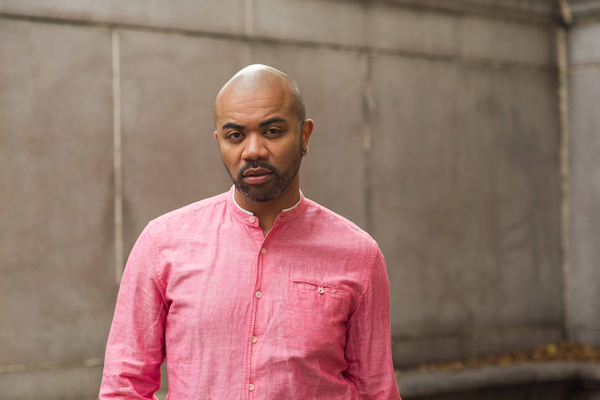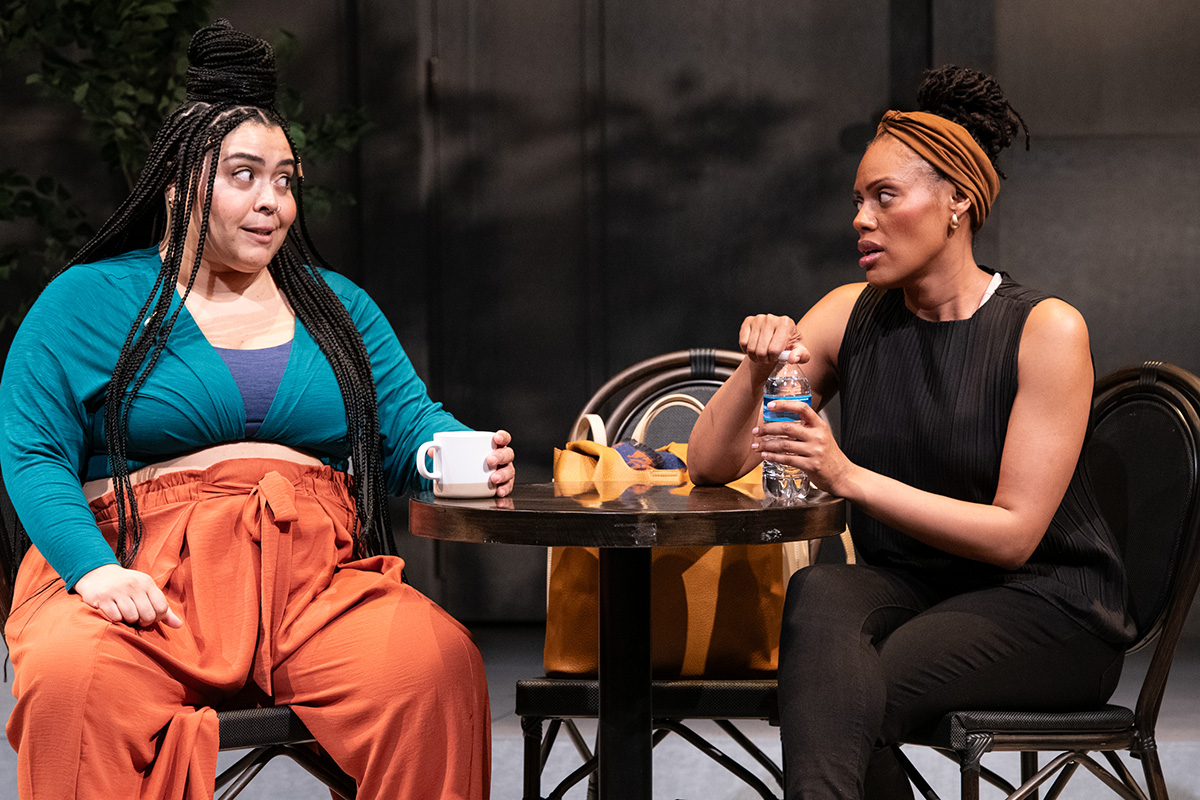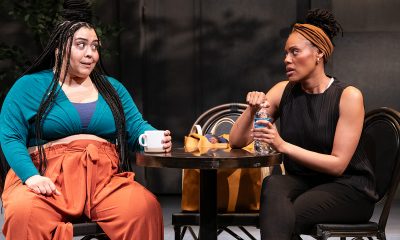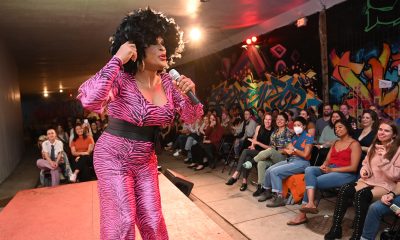Theater
In-person, virtual, and outdoor theater options abound
Your favorite D.C. stages are busy this season

In the before times, summer at the Kennedy Center meant a big Broadway musical national tour or two. Slipping into the unmistakable box’s cool, darkened red Opera House for a show during the dog days of summer is a treat I’ve enjoyed since I was kid.
But because of the pandemic, this summer the landmark’s indoor spaces remain dark. But there’s still a lot happening. The Kennedy Center’s Millennium Stage has moved outdoors to the Reach, a collection of pavilions and open areas adjacent to the original building. In this striking, open-air, riverside plaza, you’ll find loads of free entertainment ranging from live music and film screenings to dance lessons, yoga sessions, and arts markets.
While it’s too late to enjoy early June’s “The Wig Party: A Capitol Drag Festival,” there’s still much to see in-person and via livestream. Here are a few selections from the Millennium Stage program.
The DMV’s authentic Afro-Latinx experience “Adobo Gigante” (July 22-24) returns with a midsummer weekend of programming. There’s “Raga at the REACH” (Aug. 5-7), a three-day festival focused on presenting the vibrant culture and heritage of India through live music, dance, film, and local arts vendors. And in late August, it’s “On Deck: Women Shedding Through Boundaries” (Aug. 26-28), an all-inclusive festival featuring women in action sports and music like skateboarding and jazz. Visit kennedy-center.org for more information.
Elsewhere around town, companies and artists are presenting heaps of new, original work, featuring both familiar and less familiar faces.
Local out playwright George Purefoy Tilson’s new one act “Holler” premieres virtually on Sunday July 18 at 7 p.m.
Set in the hills of coal country, it’s the story of four siblings who cling to fading memories while wrestling with a haunting secret. The virtual production is directed by talented Evan Casey who is also included in the five-person cast along with Bernadette Arvidson, Emilie Zelle Holmstock, Larry Levinson, and Timothy Sayles.
“Holler’s” opening is a fundraiser for CCI Health & Wellness Services, an organization that supports the most vulnerable in local communities. For more information visit bit.ly/hollerpremiere. Subsequent streaming opportunities will soon be made available via link on the “Holler” Facebook page.
For summer of 2021, Spooky Action Theatre presents “Happy, Beyond…Happy,” a short play virtual reading series inspired by a list of “happiness words” that do not directly translate into English.
Through July 18, the two readings are playwrights Marie-Claude St-Laurent and Marie-Ève Milothelmed’s “Collect Call,” the story of sisters and their rocky relationship; and Emma Gibson’s “Adam + Rose,” a play about separation and love. Both readings are directed by esteemed gay director José Zayes. Spookyaction.org
Through July 25, Studio Theatre is streaming award-winning playwright George Brant’s “Tender Age.”
Directed by Henry Godinez, the one-person play stars New York actor Bobby Moreno as Martín, a young father who faces a moral reckoning after going to work as a security guard at a local Walmart-turned-detention center for children separated from their families at the nearby Texas border. Studio-theatre.org
Theater Alliance ends its digital season with playwright Psalmayene 24’s “The Blackest Battle” (July 31 – August 29), a revolutionary hip-hop musical that puts an original spin on urban violence.
Set on the Fourth of July in the not-too-distant future, it portrays a world where reparations have been paid to African Americans yet Black on Black violence rages on. But despite the bellicose atmosphere, two members of warring rap factions manage to fall in love.
“The Blackest Battle” is directed by Theater Alliance’s out artistic director Raymond O. Caldwell, and features a seven-person cast including talented out actor Jade Jones as Bonita. Theateralliance.com
Tyson’s 1st Stage is presenting its annual Logan Festival of Solo Performance, only this year it’s happening outdoors at busy Boro Park (8350 Broad Street, Tysons, Va.).
The festival opener is “Opera Soup” (Aug. 21 -29), a family-friendly amalgam of music and lively storytelling written and performed by accomplished opera singer Lori Brown Mirabel.
And for just two special performances (also at Boro Park), Mirabel performs an autobiographical solo piece “Charmed Life” (Aug. 27-28) in which she tells not only her own story, but also pays homage to famous opera artists who have gone before, and specifically to the Black women opera singers of the past. 1ststage.org
At Olney Theatre Center (OTC), the shady campus with its open-air amphitheater, the Root Family Stage, is ideal for safer, in-person offerings.
Beginning in late July through the end of August, OTC presents the weekly Friday night Andrew A. Isen Cabaret Series pairing some of the D.C. area’s best musical talent.
The duos include Awa Sal Secka and out actor Bobby Smith (July 23); Ines Nassara and Tracy Lynn Olivera (July 30); Donna Migliaccio, and Nova Payton (Aug. 6); Rayanne Gonzales and local gay performer Rayshun Lamarr who appeared as a contestant on TV’s “The Voice” (Aug. 13); Greg Maheu and Vishal Vaidya (Aug. 20); and finally, Malinda Kathleen Reese and Alan Wiggins (Aug. 27).
On two consecutive free admission Wednesday nights in August, OTC presents “Olney in Drag,” a two-part extravaganza where audiences are asked “enjoy a drink as these fabulous drag queens shine brighter than the stars in the evening sky.” The first show (Aug. 18) features Brooklyn Heights, Betty O’Hellno, Ariel Von Quinn, Evon Michelle.
The second show (Aug. 25) includes Kristina Kelly, Vagenesis, Tiara Missou (David Singleton who appeared in “Elf the Musical” at OTC), and Echinacea Monroe (terrific out actor Solomon Parker). Olneytheatre.org
If keeping kids entertained figures into your summer in the city, why not add some in-person youth theater to the mix?
Bethesda’s Imagination Stage is borrowing Olney Theatre’s outdoor space to reprise “Paper Dreams” (July 31 – Aug. 15), a dance-based performance about friends who live inside a wastepaper basket. A collaboration with Mons Dansa Dance Company (Barcelona, Spain), it’s directed by Claudia Moreso and remounted by Imagination Stage’s Kathryn Chase Bryer. Admission is free. Imaginationstage.org
Glen Echo Park’s Adventure Theatre is presenting “Fairytales in the Sun,” two original works performed in-person on the park’s outdoor campus.
Running through Sept. 6, “Fairy Tales in the Sun” features two one-act plays: Lara Yang’s “The Flood in the Future,” the tale of a young girl who learns some vital life lessons about sacrifice and cooperation; and Michelle Lynch’s “From Cinders to Ella,” a play about forging your own happily ever after. Both are directed by Stan Kang. Adventuretheatre-mtc.org
Theater
Round House explores serious issues related to privilege
‘A Jumping-Off Point’ is absorbing, timely, and funny

‘A Jumping-Off Point’
Through May 5
Round House Theatre
4545 East-West Highway, Bethesda, Md.
$46-$83
Roundhousetheatre.org
In Inda Craig-Galván’s new play “A Jumping-Off Point,” protagonist Leslie Wallace, a rising Black dramatist, believes strongly in writing about what you know. Clearly, Craig-Galván, a real-life successful Black playwright and television writer, adheres to the same maxim. Whether further details from the play are drawn from her life, is up for speculation.
Absorbing, timely, and often funny, the current Round House Theatre offering explores some serious issues surrounding privilege and who gets to write about what. Nimbly staged and acted by a pitch perfect cast, the play moves swiftly across what feels like familiar territory without being the least bit predictable.
After a tense wait, Leslie (Nikkole Salter) learns she’s been hired to be showrunner and head writer for a new HBO MAX prestige series. What ought to be a heady time for the ambitious young woman quickly goes sour when a white man bearing accusations shows up at her door.
The uninvited visitor is Andrew (Danny Gavigan), a fellow student from Leslie’s graduate playwriting program. The pair were never friends. In fact, he pressed all of her buttons without even trying. She views him as a lazy, advantaged guy destined to fail up, and finds his choosing to dramatize the African American Mississippi Delta experience especially annoying.
Since grad school, Leslie has had a play successfully produced in New York and now she’s on the cusp of making it big in Los Angeles while Andrew is bagging groceries at Ralph’s. (In fact, we’ll discover that he’s a held a series of wide-ranging temporary jobs, picking up a lot of information from each, a habit that will serve him later on, but I digress.)
Their conversation is awkward as Andrew’s demeanor shifts back and forth from stiltedly polite to borderline threatening. Eventually, he makes his point: Andrew claims that Leslie’s current success is entirely built on her having plagiarized his script.
This increasingly uncomfortable set-to is interrupted by Leslie’s wisecracking best friend and roommate Miriam who has a knack for making things worse before making them better. Deliciously played by Cristina Pitter (whose program bio describes them as “a queer multi-spirit Afro-indigenous artist, abolitionist, and alchemist”), Miriam is the perfect third character in Craig-Galván’s deftly balanced three-hander.
Cast members’ performances are layered. Salter’s Leslie is all charm, practicality, and controlled ambition, and Gavigan’s Andrew is an organic amalgam of vulnerable, goofy, and menacing. He’s terrific.
The 90-minute dramedy isn’t without some improbable narrative turns, but fortunately they lead to some interesting places where provoking questions are representation, entitlement, what constitutes plagiarism, etc. It’s all discussion-worthy topics, here pleasingly tempered with humor.
New York-based director Jade King Carroll skillfully helms the production. Scenes transition smoothly in large part due to a top-notch design team. Scenic designer Meghan Raham’s revolving set seamlessly goes from Leslie’s attractive apartment to smart cafes to an HBO writers’ room with the requisite long table and essential white board. Adding to the graceful storytelling are sound and lighting design by Michael Keck and Amith Chandrashaker, respectively.
The passage of time and circumstances are perceptively reflected in costume designer Moyenda Kulemeka’s sartorial choices: heels rise higher, baseball caps are doffed and jackets donned.
“A Jumping-Off Point” is the centerpiece of the third National Capital New Play Festival, an annual event celebrating new work by some of the country’s leading playwrights and newer voices.
Theater
‘Amm(i)gone’ explores family, queerness, and faith
A ‘fully autobiographical’ work from out artist Adil Mansoor

‘Amm(i)gone’
Thorough May 12
Woolly Mammoth Theatre
641 D St., N.W.
$60-$70
Woollymammoth.net
“Fully and utterly autobiographical.” That’s how Adil Mansoor describes “Amm(i)gone,” his one-man work currently playing at Woolly Mammoth Theatre.
Both created and performed by out artist Mansoor, it’s his story about inviting his Pakistani mother to translate Sophocles’s Greek tragedy “Antigone” into Urdu. Throughout the journey, there’s an exploration of family, queerness, and faith,as well as references to teachings from the Quran, and audio conversations with his Muslim mother.
Mansoor, 38, grew up in the suburbs of Chicago and is now based in Pittsburgh where he’s a busy theater maker. He’s also the founding member of Pittsburgh’s Hatch Arts Collective and the former artistic director of Dreams of Hope, an LGBTQ youth arts organization.
WASHINGTON BLADE: What spurred you to create “Amm(i)gone”?
ADIL MANSOOR: I was reading a translation of “Antigone” a few years back and found myself emotionally overwhelmed. A Theban princess buries her brother knowing it will cost her, her own life. It’s about a person for whom all aspirations are in the afterlife. And what does that do to the living when all of your hopes and dreams have to be reserved for the afterlife?
I found grant funding to pay my mom to do the translation. I wanted to engage in learning. I wanted to share theater but especially this ancient tragedy. My mother appreciated the characters were struggling between loving one another and their beliefs.
BLADE: Are you more director than actor?
MANSOOR: I’m primarily a director with an MFA in directing from Carnegie Mellon. I wrote, directed, and performed in this show, and had been working on it for four years. I’ve done different versions including Zoom. Woolly’s is a new production with the same team who’ve been involved since the beginning.
I love solo performance. I’ve produced and now teach solo performance and believe in its power. And I definitely lean toward “performance” and I haven’t “acted” since I was in college. I feel good on stage. I was a tour guide and do a lot of public speaking. I enjoy the attention.
BLADE: Describe your mom.
MANSOOR: My mom is a wonderfully devout Muslim, single mother, social worker who discovered my queerness on Google. And she prays for me.
She and I are similar, the way we look at things, the way we laugh. But different too. And those are among the questions I ask in this show. Our relationship is both beautiful and complicated.
BLADE: So, you weren’t exactly hiding your sexuality?
MANSOOR: In my mid-20s, I took time to talk with friends about our being queer with relation to our careers. My sexuality is essential to the work. As the artistic director at Dreams of Hope, part of the work was to model what it means to be public. If I’m in a room with queer and trans teenagers, part of what I’m doing is modeling queer adulthood. The way they see me in the world is part of what I’m putting out there. And I want that to be expansive and full.
So much of my work involves fundraising and being a face in schools. Being out is about making safe space for queer young folks.
BLADE: Have you encountered much Islamophobia?
MANSOOR: When 9/11 happened, I was a sophomore in high school, so yes. I faced a lot then and now. I’ve been egged on the street in the last four months. I see it in the classroom. It shows up in all sorts of ways.
BLADE: What prompted you to lead your creative life in Pittsburgh?
MANSOOR: I’ve been here for 14 years. I breathe with ease in Pittsburgh. The hills and the valleys and the rust of the city do something to me. It’s beautiful, it’ affordable, and there is support for local artists. There’s a lot of opportunity.
Still, the plan was to move to New York in September of 2020 but that was cancelled. Then the pandemic showed me that I could live in Pittsburgh and still have a nationally viable career.
BLADE: What are you trying to achieve with “Amm(i)gone”?
MANSOOR: What I’m sharing in the show is so very specific but I hear people from other backgrounds say I totally see my mom in that. My partner is Catholic and we share so much in relation to this.
I hope the work is embracing the fullness of queerness and how means so many things. And I hope the show makes audiences want to call their parents or squeeze their partners.
Theater
Jessica Phillips shines in ‘Penelope,’ a ‘pandemic parable’
Alex Bechtel was inspired to write about loneliness, waiting, separation

‘Penelope’
Thorough April 28
Signature Theatre, the Ark
4200 Campbell Ave, Arlington
$40-$99
Sigtheatre.org
In the new musical “Penelope,” Broadway’s Jessica Phillips gives an unforgettable take on the title role torn from the pages of Homer’s “Odyssey” — more or less. Fortified by bourbon and backed by a Greek chorus of musicians, the character uncharacteristically steps out from the background to share her story surrounding two decades waiting on the island kingdom of Ithica for the return of her absent husband Odysseus.
Sometimes described as a “pandemic parable,” the 70-minute work is based on composer/playwright Alex Bechtel’s personal experience. While separated from his partner during COVID, he was inspired to write about loneliness, waiting, and separation, a subject Phillips was eager to tackle.
An accomplished Broadway actor and mother of two, Phillips, 52, is best known for memorable turns in “Dear Evan Hansen,” “The Scarlet Pimpernel,” “Next to Normal,” and “Priscilla Queen of the Desert.”
Two years ago, she made news for coming out as queer after having long been identified as straight. Parts of the theater scene were caught a bit off guard, but only momentarily. Now, she lives in New York with her partner Chelsea Nachman, a theatrical publicist.“We share the same professional community but in very different roles. I think that makes life easier for us.”
Currently enjoying an extended run at Signature in Arlington where the trees are in bloom, she spares time for a phone interview, starting off with“Perfect timing. I’ve just finished the last song on Beyonce’s ‘Cowboy Carter.’ Let’s talk.”
WASHINGTON BLADE: Increasingly, I hear artists report having been deeply changed by the pandemic. Did that have anything to do with your coming out in 2022?
PHILLIPS: Definitely. During the pandemic, those of us in the arts were in deep crisis, because our industry had collapsed in almost every way. At the same time, that space allowed us to be contemplative about where we were. For me, that period of time gave me the space to both come to terms with and confront those fears about saying who I was, out loud and publicly.
BLADE: Did you have professional concerns?
PHILLIPS: Oh yeah, I was specifically worried about perception. Not so much about being queer but more what it meant to have come out relatively late in life. I had some fear around whether people would take me less seriously.
At the same time, I was nervous about being fully transparent and worried about my privacy and being vulnerable. Like other women I knew, I was more comfortable dealing with traditional societal expectations in America. I grew up with those cultural expectations and thought of myself in those terms for a long time.
BLADE: What changed?
PHILLIPS: What’s been so freeing for me, I can confront how I took on those expectations and say I’m not going to let those determine how I live my life. I get to decide.
BLADE: There’s a lot of wonderful storytelling in “Penelope.” What’s been your way into that?
PHILLIPS: My way of moving through the show is allowing this character to experience all five stages of grief. Humor, slapstick comedy, bargaining, denial. And ultimately acceptance and deep grief.
When an audience is alive and invested, it’s palpable and elevates the storytelling. When an audience is having a thinking rather feeling experience that changes the tone of my storytelling and not in a bad way.
It’s interesting how much they’re a part of everything. It’s really intimate. The audience is just six feet away. It’s a unique experience and we’re on this ride together. And I find this to be a really beautiful and satisfying experience that I’ve not had before.
BLADE: After Signature, what’s next for “Penelope”?
PHILLIPS: That’s the million-dollar question. Hopefully we’ll take it forward to New York or tour it, but that requires willingness and money. I do think there’s a broad audience for this. It’s beautiful, unique, artistic, really emotional, and at the same time possesses an intellectual quality that’s missing from a lot of commercial theater these days.
BLADE: And what’s next for theater?
Phillips: I think one good thing that came out of the pandemic is that people like Alex Bechtel had an opportunity to create. In the next decade we’re going to see the results of that. I think we have some extraordinary things to look forward to. If a work like “Penelope” is any indication, we’re all in for something really good.
-

 State Department4 days ago
State Department4 days agoState Department releases annual human rights report
-

 District of Columbia2 days ago
District of Columbia2 days agoCatching up with the asexuals and aromantics of D.C.
-

 South America2 days ago
South America2 days agoArgentina government dismisses transgender public sector employees
-

 Politics5 days ago
Politics5 days agoSmithsonian staff concerned about future of LGBTQ programming amid GOP scrutiny










